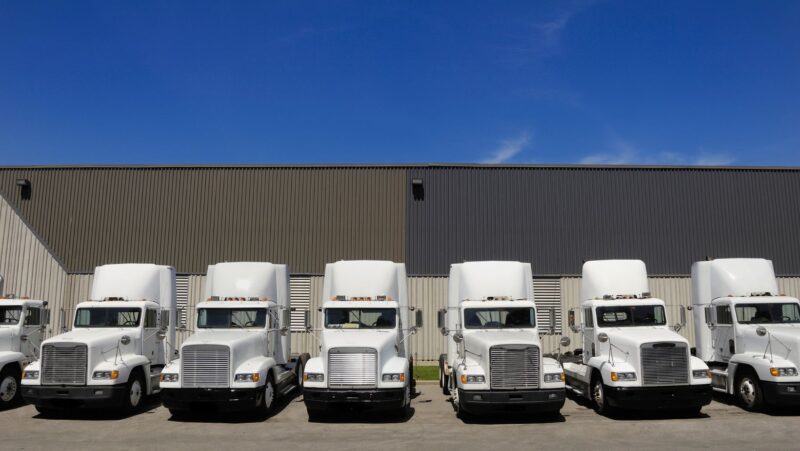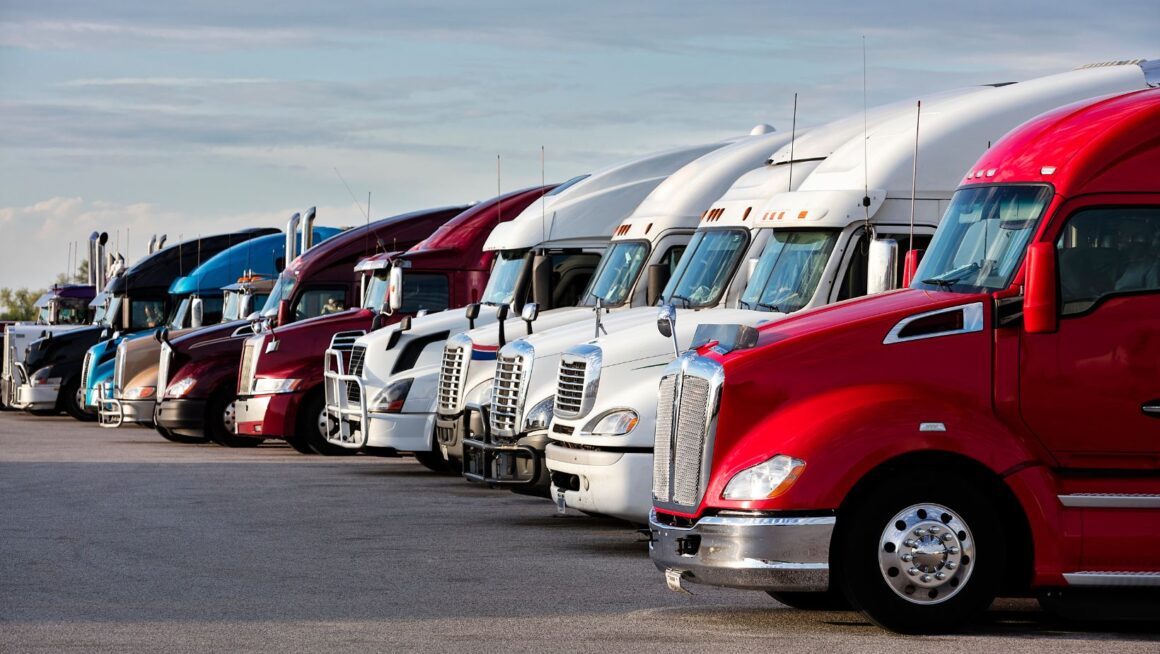Table of Contents
Toggle Starting a trucking business requires more than just a fleet of trucks and a willingness to hit the open road. It demands a solid foundation, one built on a well-thought-out business plan. This blueprint not only guides the business through its initial setup but also ensures its growth and sustainability in the highly competitive transportation industry. A trucking business plan outlines everything from your niche market and financial projections to your marketing strategies and operational procedures.
Starting a trucking business requires more than just a fleet of trucks and a willingness to hit the open road. It demands a solid foundation, one built on a well-thought-out business plan. This blueprint not only guides the business through its initial setup but also ensures its growth and sustainability in the highly competitive transportation industry. A trucking business plan outlines everything from your niche market and financial projections to your marketing strategies and operational procedures.
Crafting a comprehensive plan can seem daunting, but it’s an essential step for success. It helps entrepreneurs secure financing, understand their competition, and navigate the complexities of the trucking sector. With the right approach, a trucking business plan turns aspirations into actionable steps, setting the stage for profitability and long-term achievement. Let’s dive into the key components that make a trucking business plan your roadmap to success.
Trucking Business Plan
The Importance of a Solid Business Plan
 A solid business plan serves as the backbone of any successful trucking business. It’s a critical tool for attracting investors, securing financing, and laying down the foundation for future growth and sustainability. In the trucking industry, where competition is fierce and operational costs can skyrocket, having a meticulously outlined plan helps to navigate through challenges efficiently. It ensures that every facet of the business, from financial management to customer acquisition strategies, aligns with the overarching goals. Furthermore, a comprehensive trucking business plan enables business owners to make informed decisions, anticipate potential setbacks, and devise effective contingency plans.
A solid business plan serves as the backbone of any successful trucking business. It’s a critical tool for attracting investors, securing financing, and laying down the foundation for future growth and sustainability. In the trucking industry, where competition is fierce and operational costs can skyrocket, having a meticulously outlined plan helps to navigate through challenges efficiently. It ensures that every facet of the business, from financial management to customer acquisition strategies, aligns with the overarching goals. Furthermore, a comprehensive trucking business plan enables business owners to make informed decisions, anticipate potential setbacks, and devise effective contingency plans.
Conducting Market Research
Identifying Your Niche
 Identifying a niche within the trucking industry stands as a fundamental step in conducting market research for a trucking business plan. It involves pinpointing a specific segment of the market where the demand for transport services is either under-served or where the company can offer unique value propositions. Examples of niches include temperature-controlled goods transport, hazardous materials, or oversized load trucking. By focusing on a particular niche, a trucking business can tailor its services to meet the unique needs of a specific customer base, reducing direct competition and enhancing profitability.
Identifying a niche within the trucking industry stands as a fundamental step in conducting market research for a trucking business plan. It involves pinpointing a specific segment of the market where the demand for transport services is either under-served or where the company can offer unique value propositions. Examples of niches include temperature-controlled goods transport, hazardous materials, or oversized load trucking. By focusing on a particular niche, a trucking business can tailor its services to meet the unique needs of a specific customer base, reducing direct competition and enhancing profitability.
Analyzing Competitors
 A thorough competitor analysis is critical in understanding the competitive landscape of the trucking industry. This process involves identifying local and national competitors, assessing their strengths and weaknesses, and understanding their value propositions. Factors to consider include the range of services offered, pricing strategies, customer service practices, and technological adoption. By evaluating competitors, a trucking business can identify gaps in the market, opportunities for differentiation, and potential threats to its growth and sustainability. This analysis provides valuable insights that help in shaping effective marketing and operational strategies, ensuring a competitive edge in the trucking business plan.
A thorough competitor analysis is critical in understanding the competitive landscape of the trucking industry. This process involves identifying local and national competitors, assessing their strengths and weaknesses, and understanding their value propositions. Factors to consider include the range of services offered, pricing strategies, customer service practices, and technological adoption. By evaluating competitors, a trucking business can identify gaps in the market, opportunities for differentiation, and potential threats to its growth and sustainability. This analysis provides valuable insights that help in shaping effective marketing and operational strategies, ensuring a competitive edge in the trucking business plan.
Financial Projections and Funding
Creating a trucking business plan involves careful financial planning, which is critical for securing financing, attracting investors, and ensuring sustainable growth. This section outlines the necessary steps to estimate start-up costs, plan for ongoing expenses, and explore financing options for a trucking business.
Estimating Start-Up Costs
 Estimating start-up costs is the first crucial step in financial planning for a trucking business. These costs typically include the purchase or lease of trucks, obtaining the required licenses and permits, insurance premiums, and establishing an operational base. Prospective owners must also consider the expenses related to technology, such as fleet management software, and initial marketing efforts to introduce the business to the market. Accurate estimation of these costs sets the groundwork for financial projections, enabling business owners to seek adequate funding.
Estimating start-up costs is the first crucial step in financial planning for a trucking business. These costs typically include the purchase or lease of trucks, obtaining the required licenses and permits, insurance premiums, and establishing an operational base. Prospective owners must also consider the expenses related to technology, such as fleet management software, and initial marketing efforts to introduce the business to the market. Accurate estimation of these costs sets the groundwork for financial projections, enabling business owners to seek adequate funding.
Planning for Ongoing Expenses
 After estimating the start-up costs, attention must shift to planning for ongoing expenses, which are integral to the trucking business’s operational sustainability. Ongoing expenses include fuel, maintenance and repairs of the fleet, driver salaries, insurance payments, and operational costs such as office rent, utilities, and staff salaries if applicable. Planning for these expenses requires a detailed understanding of the operational workflow and efficiency measures to optimize cost management. This planning ensures the business’s profitability is accurately projected in the trucking business plan, demonstrating financial viability to investors and lenders.
After estimating the start-up costs, attention must shift to planning for ongoing expenses, which are integral to the trucking business’s operational sustainability. Ongoing expenses include fuel, maintenance and repairs of the fleet, driver salaries, insurance payments, and operational costs such as office rent, utilities, and staff salaries if applicable. Planning for these expenses requires a detailed understanding of the operational workflow and efficiency measures to optimize cost management. This planning ensures the business’s profitability is accurately projected in the trucking business plan, demonstrating financial viability to investors and lenders.
Exploring Financing Options
 Once start-up and ongoing expenses are thoroughly estimated, trucking businesses must explore financing options to fund their operations. Options include traditional bank loans, Small Business Administration (SBA) loans, leasing companies for equipment financing, and seeking investment from private investors or venture capitalists. Each option has unique requirements, benefits, and drawbacks, such as interest rates, loan terms, or sharing equity with investors. A compelling trucking business plan highlighting detailed financial projections and a clear business model significantly enhances the likelihood of securing the necessary funding. Business owners should prepare to negotiate terms and demonstrate how the investment will be utilized to ensure business growth and profitability.
Once start-up and ongoing expenses are thoroughly estimated, trucking businesses must explore financing options to fund their operations. Options include traditional bank loans, Small Business Administration (SBA) loans, leasing companies for equipment financing, and seeking investment from private investors or venture capitalists. Each option has unique requirements, benefits, and drawbacks, such as interest rates, loan terms, or sharing equity with investors. A compelling trucking business plan highlighting detailed financial projections and a clear business model significantly enhances the likelihood of securing the necessary funding. Business owners should prepare to negotiate terms and demonstrate how the investment will be utilized to ensure business growth and profitability.
Compliance and Legal Considerations
A trucking business plan must address compliance and legal considerations thoroughly to ensure smooth operations and protect the company from potential legal issues. This part of the plan includes obtaining necessary licenses and permits and understanding insurance requirements, both vital for legal operation and risk management in the trucking industry.
Obtaining Necessary Licenses and Permits
 For a trucking business to operate legally, it needs specific licenses and permits, which vary by location and the nature of the trucking operations. The primary license required is the Commercial Driver’s License (CDL) for drivers. Moreover, businesses must secure a Motor Carrier (MC) Number and USDOT Number from the Federal Motor Carrier Safety Administration (FMCSA), essential for interstate operations.
For a trucking business to operate legally, it needs specific licenses and permits, which vary by location and the nature of the trucking operations. The primary license required is the Commercial Driver’s License (CDL) for drivers. Moreover, businesses must secure a Motor Carrier (MC) Number and USDOT Number from the Federal Motor Carrier Safety Administration (FMCSA), essential for interstate operations.
Local and state requirements may also mandate additional permits, especially when transporting hazardous materials or operating in environmentally sensitive areas. Failure to obtain these licenses can result in significant fines, and possibly, the suspension of business operations. Including a comprehensive list of necessary licenses and permits in the trucking business plan, along with the process and costs associated with securing them, is essential for demonstrating compliance readiness to investors and financial institutions.
Understanding Insurance Requirements
 Insurance is a cornerstone of risk management in the trucking industry, protecting the business from liabilities resulting from accidents, cargo damage, and litigation. At a minimum, trucking companies must have liability insurance to cover damages or injuries to third parties. However, they should also consider additional coverages, such as cargo insurance, physical damage insurance, and workers’ compensation insurance, depending on the size of the operation and the types of goods transported.
Insurance is a cornerstone of risk management in the trucking industry, protecting the business from liabilities resulting from accidents, cargo damage, and litigation. At a minimum, trucking companies must have liability insurance to cover damages or injuries to third parties. However, they should also consider additional coverages, such as cargo insurance, physical damage insurance, and workers’ compensation insurance, depending on the size of the operation and the types of goods transported.
The cost of insurance can be a significant expense for a trucking business, so it’s crucial to accurately estimate these costs in the financial projections of the business plan. Furthermore, understanding the claims process and insurance company requirements for maintaining coverage, such as driver training programs and regular vehicle maintenance, is essential.
Marketing Your Trucking Business
Following the comprehensive outline on compliance and legal considerations necessary for a trucking business, the focus now shifts to effectively marketing your trucking business. This marketing strategy, a critical part of your trucking business plan, aims to set your business apart in the competitive trucking industry, attract quality leads, and convert them into loyal customers.
Building a Strong Brand
 Creating a strong brand for your trucking business involves more than just a memorable logo or catchy slogan. It requires a deep understanding of your target audience, what sets your business apart from competitors, and how your services address the unique needs of your clients. A robust brand strategy for a trucking company might include emphasizing reliability, speed of delivery, safety records, and exceptional customer service. Investing in high-quality branding materials, such as business cards, truck decals, and uniforms, helps ensure that every touchpoint with customers reinforces your brand’s values and promises.
Creating a strong brand for your trucking business involves more than just a memorable logo or catchy slogan. It requires a deep understanding of your target audience, what sets your business apart from competitors, and how your services address the unique needs of your clients. A robust brand strategy for a trucking company might include emphasizing reliability, speed of delivery, safety records, and exceptional customer service. Investing in high-quality branding materials, such as business cards, truck decals, and uniforms, helps ensure that every touchpoint with customers reinforces your brand’s values and promises.
Furthermore, storytelling can be a powerful tool in building your brand. Sharing your journey, challenges overcome, and milestones achieved through various channels establishes an emotional connection with your audience, making your trucking business more relatable and memorable.
Digital Marketing Strategies for Trucking Companies
 In today’s digital age, having an online presence is non-negotiable for businesses aiming for growth, and trucking companies are no exception. A comprehensive digital marketing strategy starts with a professional website that is easy to navigate and mobile-friendly, providing clear information on services offered, company history, and how potential clients can get in touch. Including a blog on your website can also drive organic traffic by educating visitors about your sector’s aspects and showcasing your expertise in the field.
In today’s digital age, having an online presence is non-negotiable for businesses aiming for growth, and trucking companies are no exception. A comprehensive digital marketing strategy starts with a professional website that is easy to navigate and mobile-friendly, providing clear information on services offered, company history, and how potential clients can get in touch. Including a blog on your website can also drive organic traffic by educating visitors about your sector’s aspects and showcasing your expertise in the field.
Social media platforms offer another avenue to connect with potential customers and industry peers. Platforms like LinkedIn, Facebook, and Instagram enable trucking companies to share updates, industry news, and behind-the-scenes content, fostering a sense of community and keeping your brand top of mind.









































































































